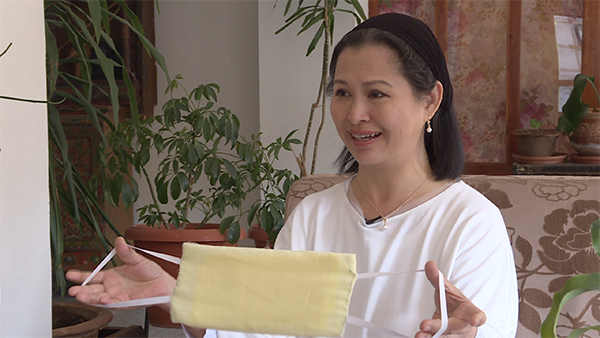
Lack of access to sanitation remains a challenge to menstrual hygiene management, more so in nunneries that receive no or little funding from the government unlike monasteries. Access to even basic sanitary needs like pads, let alone other facilities, is limited.
Ruby Song from Kuala Lumpur visited several nunneries in Thimphu and Punakha recently, teaching nuns how to make reusable pads using cloth pieces. “Recyclable and eco-friendly is the key word. These are all made of cotton materials. It’s zero plastic,” Ruby said as she explained steps in sowing reusable pads.
The 53-year-old Malaysian is a cancer survivor. Ruby gave up her anti-aging business two years ago to pursue her passion in helping underprivileged women to improve their well-being in the areas of education and hygiene.
|
|
|---|
Access to sanitary pad, she believes, is vital for empowering women and enhancing their productivity. “There are lots of girls of school going age who quit school after they get their period. How can we eradicate poverty when girls don’t attend school?” she said.
“During their period, they hide for four to five days because they do not have access to basic sanitary pads. But once we teach them how to sow pads, and these things can last for about four months, and within this four-month cycle, they can use the sanitary pads and carry on their daily activities without any interference.”
Teaching nuns how to make reusable pads is also a key part of Bhutan Nuns Foundation’s Menstrual Hygiene Management training. With support from UNICEF, the foundation has even provided sewing machines to some nunneries in Eastern Bhutan.
Commercial sanitary pads are not easily available in remote nunneries. Even if it is, not all nuns can afford it. Thus, reusable pads are being promoted as an alternative to commercial pads.
“They cannot buy in stock because there is no money. The nuns in remote nunneries still use cloth pieces,” Anim Namgyel Lhamo, an Assistant Programme Officer with Bhutan Nuns Foundation, said.
However, menstrual hygiene may start with sanitary pads, but doesn’t end with it. Access to proper toilets, equipped with soap and water, is equally important. Facilities for safe disposal of used sanitary pads essential as well. But not all nunneries have these facilities in place.
“Even if we teach them practical advice on how to manage menstruation, it does little help because they do not have access to enough water to wash. Nor are there enough toilets. Whenever I visit nunneries, the nuns tell me to do something about pad disposal,” Anim Namgyel Lhamo said.
Dr. Dekee Yangzom of Gidakom Hospital is actively engaged in advocating menstrual hygiene in schools and nunneries. She also knows how dire the situation can be at times. “The public toilets, and also in schools and institutions, there is hardly any water available,” she said.
“There is also a need to place closed dustbins in girls’ toilets for disposal of used sanitary pads so it’s not flushed down the toilets, which causes lots of problems.”
She says menstrual hygiene is not something to be taken lightly. “It increases the risk of reproductive and urinary tract infection, which can lead to fertility issues later in their lives. The other thing is if you don’t change your sanitary pads from time to time, it can cause skin problems.”
Lack of sanitation facilities is known to keep girls away from school. According to Knowledge, Attitude and Practices Survey on Menstrual Hygiene Management conducted in 2017 by Department of Education and UNICEF, 48 per cent of girls missed school due to period cramps and discomfort.
Seventy eight per cent of adolescent nuns said they miss classes or activities during period because they find toilets too dirty to use.
According to UNICEF, in schools, girls’ toilets are often located too close to boys’ toilets, causing privacy concerns.
Nuns and girls also reported only taking half-body bath during period due to lack of hot water.
All these call for a need to improve water and sanitation facilities in schools and nunneries so that nuns and schoolgirls do not compromise on menstrual hygiene and skip classes.
“Effective menstrual hygiene is very important to improve the general health of girls and women. It also gives them dignity. It empowers them and aids them in reaching their full potential at work places,” Dr. Dekee says.












